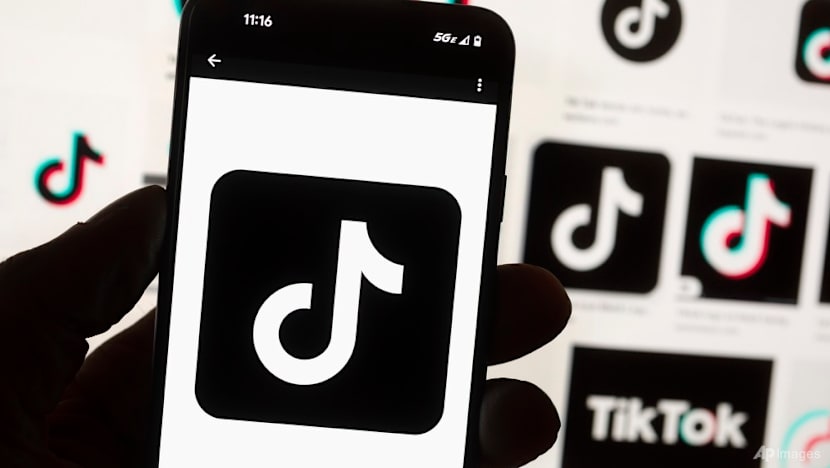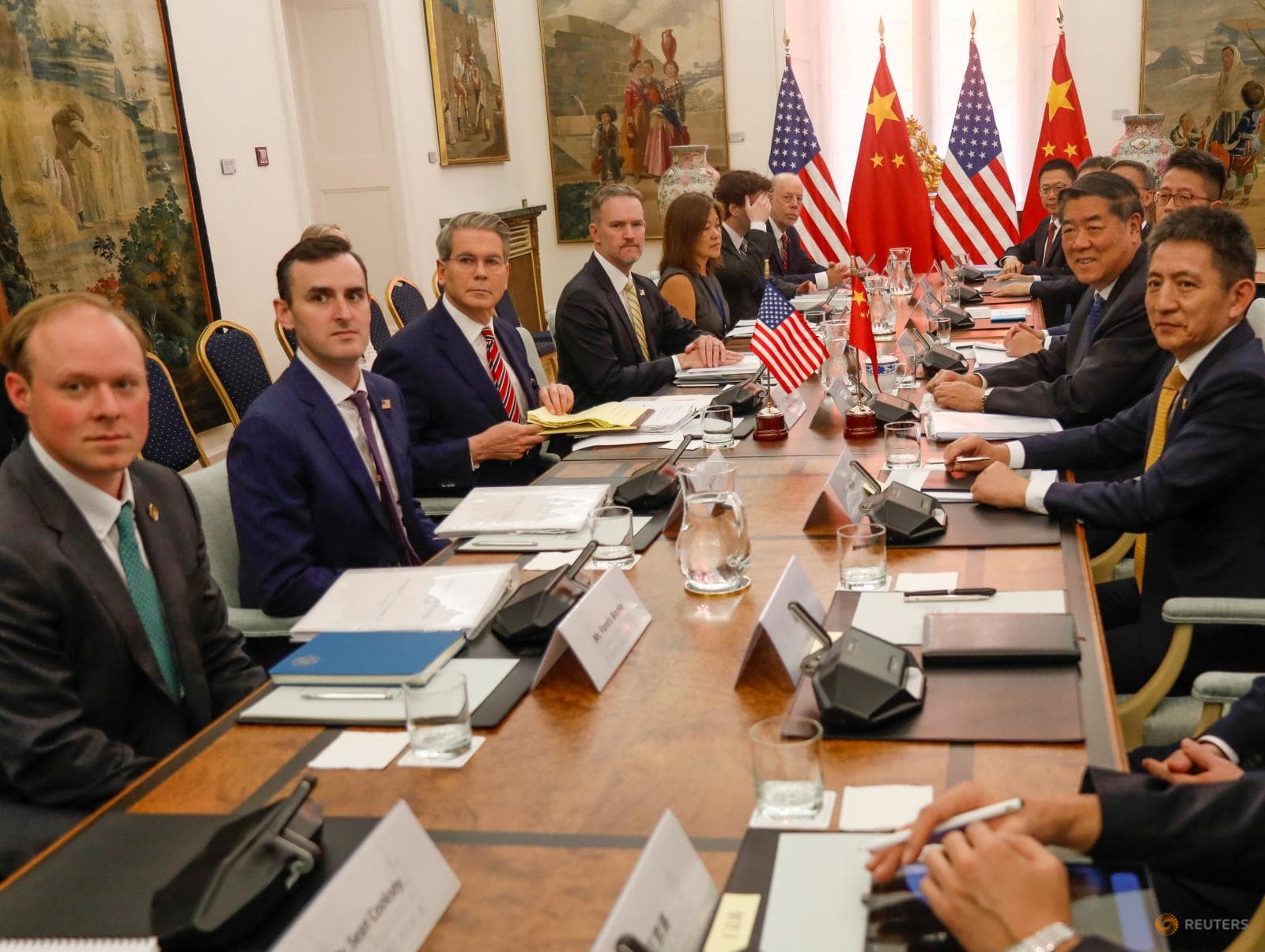What hurdles lie ahead for any US-China TikTok deal?
Any agreement could require approval by the Republican-controlled Congress, which passed a law in 2024 requiring ByteDance to divest TikTok or face a ban in the US.

The TikTok logo is seen on a mobile phone in front of a computer screen which displays the TikTok home screen, Oct 14, 2022, in Boston. (Photo: AP/Michael Dwyer)
WASHINGTON: Questions and potential hurdles surround a framework agreement announced on Monday (Sep 15) between the US and China that would switch short-video app TikTok to US-controlled ownership, including whether any deal will comply with a 2024 law.
US and Chinese officials announced the deal in principle in Madrid following trade talks, but did not give details or answer key questions, such as whether China will agree to transfer ownership of the algorithm that makes the app so popular with 170 million Americans.
US Treasury Secretary Scott Bessent said the objective of the deal would be to switch to American ownership.
He did not disclose the terms of the deal, saying that it was between two private parties, but added that "the commercial terms have been agreed upon".
Bessent added that a Sep 17 deadline could be extended by 90 days to allow the deal to be finalised.
WHAT IS THE DEAL?
Little is known about the actual deal in the works, including what companies are involved and whether the United States would have a stake in TikTok.
Li Chenggang, China’s international trade representative, said the two sides have reached "basic framework consensus" to properly solve TikTok-related issues in a cooperative way, reduce investment barriers and promote related economic and trade cooperation, according to China’s official news agency Xinhua.
Wang Jingtao, deputy director of China’s Central Cyberspace Affairs Commission, told reporters in Madrid there was consensus on authorisation of "the use of intellectual property rights such as (TikTok’s) algorithm" - a main sticking point in the deal.
The sides also agreed on entrusting a partner with handling US user data and content security, he said.
US Trade Representative Jamieson Greer said the team was "very focused on TikTok and making sure that it was a deal that is fair for the Chinese", but also "completely respects US national security concerns".

WHAT HAPPENS TO THE ALGORITHM?
During previous negotiations, Chinese authorities expressed strong reluctance to allow the export of TikTok’s recommendation algorithm, widely seen as owner ByteDance’s most valuable asset and a key driver of the app's global popularity.
In 2020, when US President Donald Trump's administration first pushed for a sale of TikTok’s US business, China updated its export control rules to cover technologies such as recommendation algorithms, effectively giving the government a say over any transfer.
During Joe Biden’s presidency, Congress and the White House used national security grounds to approve a US ban on TikTok unless its Chinese parent company sold its controlling stake.
US officials were concerned about ByteDance’s roots and ownership, pointing to laws in China that require Chinese companies to hand over data requested by the government.
Another concern became the proprietary algorithm that populates what users see on the app.
WILL CONGRESS NEED TO APPROVE THE DEAL?
Any agreement could require approval by the Republican-controlled Congress, which passed a law in 2024 requiring ByteDance to divest TikTok or face a ban in the US, due to fears that TikTok's US user data could be accessed by the Chinese government and allow Beijing to spy on Americans or conduct influence operations through the app.
Since that law came into effect, Trump has extended the deadline for its enforcement three times.
Some Democratic lawmakers argued Trump had no legal authority to extend the deadline and suggested a previous deal under consideration in April would not meet legal requirements.
It is not clear how many times Trump can do so as the government continues to try to negotiate a deal for TikTok.
While there is no clear legal basis for the extensions, so far, there have been no legal challenges against the administration.
Attorney General Pam Bondi sent letters to Apple, Google and other companies in February that provide services or host TikTok, telling them the Justice Department was relinquishing any claims for potential violations of the law. They were made public in June.
A congressional aide told Reuters on Monday that lawmakers plan to scrutinise the latest deal when it is made public to see if it complies with the law.
WILL CHINA RETAIN ANY OWNERSHIP?
One issue is whether ByteDance will be fully divested from TikTok US after the deal.
Trump responded to a question in an Oval Office press conference on whether China will have a stake in TikTok: "We haven't decided that, but it looks to me and I'm speaking to President Xi on Friday for confirmation."
Senate Intelligence Committee chair Tom Cotton in April said American investors who wanted to buy TikTok must cut all ties with China.
ByteDance's current shareholders include American firms Susquehanna International Group, General Atlantic, KKR and Andreessen Horowitz.
Oracle has been floated as a likely buyer for the platform.
If Congress rejects the latest agreement, Trump may have limited recourse.
In January, the Supreme Court unanimously ruled that the law, passed by an overwhelming bipartisan majority in Congress last year and signed by former President Joe Biden, did not violate the US Constitution's First Amendment protection against government abridgement of free speech.
Officials also expect the final deal to be very similar to what was anticipated under the previous deal outlined in April, which would spin off TikTok's US operations into a new US-based firm, majority-owned and operated by US investors.
This stalled after China indicated it would withhold its approval following Trump's announcements of steep tariffs on Chinese goods. The precise structure of the new expected ownership remains unclear.
HOW IS TIKTOK VIEWED IN AMERICA?
For now, TikTok continues to function for its 170 million users in the US.
Tech giants Apple, Google and Oracle were persuaded to continue to offer and support the app, on the promise that Trump’s Justice Department would not use the law to seek potentially steep fines against them.
Americans are even more closely divided on what to do about TikTok than they were two years ago.
A recent survey found that about one-third of Americans said they supported a TikTok ban, down from 50 per cent in March 2023. Roughly one-third said they would oppose a ban, and a similar percentage said they were not sure.
Among those who said they supported banning the social media platform, about eight in 10 cited concerns over users’ data security being at risk as a major factor in their decision, according to the report.















